| Srl | Item |
| 1 |
ID:
020400


|
|
|
|
|
| Publication |
Autumn 2001.
|
| Description |
105-116
|
|
|
|
|
|
|
|
|
|
|
|
|
|
|
|
| 2 |
ID:
145949
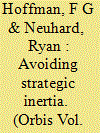

|
|
|
|
|
| Summary/Abstract |
The next Administration will want to examine the last 15 years of strategic performance to improve sound strategy options and to promote timely re-assessment and adaptation of approved policies and strategies. Building off of two recent studies of U.S. decisionmaking and policy implementation at the strategic level, this article examines proposals to enhance the quality of policy making and implementation oversight mechanisms at the National Security Council. Major recommendations are offered to improve interagency planning and the creation of an inter-agency community of national security professionals.
|
|
|
|
|
|
|
|
|
|
|
|
|
|
|
|
| 3 |
ID:
052341


|
|
|
|
|
| Publication |
Jul-Aug 2004.
|
| Summary/Abstract |
In the 1980s Condoleezza Rice was a prodigy on the national security scene. In the 1990s she rose to the top of her field. Where did she go wrong?
|
|
|
|
|
|
|
|
|
|
|
|
|
|
|
|
| 4 |
ID:
091523
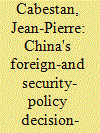

|
|
|
|
|
| Publication |
2009.
|
| Summary/Abstract |
Since 1979, foreign-and security-policy-making and implementation processes have gradually and substantially changed. New modes of operation that have consolidated under Hu Jintao, actually took shape under Jiang Zemin in the 1990's and some, under Deng Xiaoping. While the military's role has diminished, that of diplomats, experts, and bureaucracies dealing with trade, international economic relations, energy, propaganda and education has increased.
|
|
|
|
|
|
|
|
|
|
|
|
|
|
|
|
| 5 |
ID:
097540
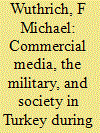

|
|
|
| 6 |
ID:
142306
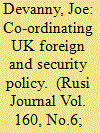

|
|
|
|
|
| Summary/Abstract |
Since 2010 the National Security Council (NSC) has won plaudits for improving the clarity and regularity of national-security co-ordination. It has also been criticised for strategic shortcomings and a lack of capacity to drive forward the implementation of its decisions across government. Joe Devanny appraises the NSC's performance and future prospects, although without access to NSC proceedings it is difficult to infer the quality of its decisions or the coherence of its policies from the ambiguous evidence of apparent policy outcomes or public statements. So closely is the NSC associated with Prime Minister David Cameron that his expected retirement by 2020 renders its future uncertain.
|
|
|
|
|
|
|
|
|
|
|
|
|
|
|
|
| 7 |
ID:
051947


|
|
|
| 8 |
ID:
118206
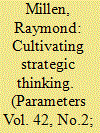

|
|
|
| 9 |
ID:
139038
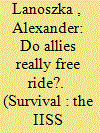

|
|
|
|
|
| Summary/Abstract |
American decision-makers and security analysts often complain that allies ‘free ride’ on the United States. In 2011, then-secretary of defense Robert Gates spoke of how ‘nations [are] apparently willing and eager for American taxpayers to assume the growing security burden left by reductions in European defense budgets’, and warned of NATO’s ‘dismal future’ if European allies did not contribute their fair share.
|
|
|
|
|
|
|
|
|
|
|
|
|
|
|
|
| 10 |
ID:
129925


|
|
|
|
|
| Publication |
2014.
|
| Summary/Abstract |
The Turkish model deemed most relevant to 2011-12 post-Mubarak Egypt was the Islamist-led transformation of the polity and economy that occurred following the rise to power of the Justice and Development Party (AKP) in the 2002 general election. As it transpired, this version of the Turkish model lasted but one year before another took its place. That model was the political project of the Turkish military that seized power in September 1980. This thirty-one year old Turkish model of a constitutionally empowered executive body, controlled by the military appears to have trumped the contemporary, Islamist one in Egypt. But the Turkish military coup of 1980 unwittingly and unintentionally laid the groundwork for the transition that ultimately swept it from power and its leaders into jail. The pertinent question then is will Egypt's civilian political and economic actors be similarly and sufficiently astute to exploit the opportunities they inevitably will have even under military rule? Egyptian political forces will inevitably mount serious challenges as they did in Turkey. In Egypt, however, the domestic and regional political and economic contexts are so different from those in Turkey that the outcome of the struggle for power between civilians and the military are likely to deviate substantially from this Turkish model.
|
|
|
|
|
|
|
|
|
|
|
|
|
|
|
|
| 11 |
ID:
168788


|
|
|
|
|
| Summary/Abstract |
This paper shows how a series of institutional reforms since 1994 have transformed the Japanese prime minister’s relationship with other actors in the Japanese parliamentary system and expanded his power. It further discloses that his power has grown even more since the formation of the second Abe administration in 2012.
|
|
|
|
|
|
|
|
|
|
|
|
|
|
|
|
| 12 |
ID:
153322
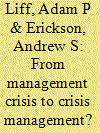

|
|
|
|
|
| Summary/Abstract |
Since 2012, China’s assertion of its sovereignty claim to the contested Senkaku/Diaoyu Islands has significantly raised the risk of a potentially escalatory political-military crisis with Japan. As circumstances worsen, Japanese Prime Minister Shinzo Abe has championed major institutional reforms aimed at centralizing Japanese security policy decision-making and vastly improving crisis management. This article assesses these reforms’ significance for ameliorating Japan’s long-standing internal crisis management weaknesses, and enhancing its ability to communicate with Beijing promptly under challenging conditions. While significant issues remain, recent developments – especially the establishment of Japan’s first-ever National Security Council – demonstrate significant progress. Bilaterally, however, important firebreaks remain conspicuously absent.
|
|
|
|
|
|
|
|
|
|
|
|
|
|
|
|
| 13 |
ID:
156482


|
|
|
|
|
| Summary/Abstract |
In recent years, prominent voices in the Israeli academic and political arenas have
increased their criticism of the Israeli Defense Force’s (IDF) dominant role in policy
and decision-making processes in the country. The 1967 Six–Day War is perhaps
the bedrock upon which IDF critics’ fears of a dominant military rest upon. They
disapprove of the pressure that the military’s high command put on the government
to go to war and argue that the IDF was overly dominant in determining its
goals and strategic moves on the battlefield. The following analysis debunks the
claims of IDF critics by presenting historical evidence that shows how political
considerations overrode military calculations on the way to and during the war. It
also highlights the vital contribution of the IDF’s high command to decision-making
at significant crossroads. In this regard, the analysis uses organizational theory logic
to question the suggestion of IDF critics to empower the National Security Council
(NSC) so it could provide the government with alternative analyses and courses
of action to those suggested by the IDF. Significantly, the analysis concludes
that by empowering the NSC at the expense of the IDF, the government might
invite confusion rather than clarity and efficiency to policy and decision-making
processes, especially in times of crises and war—when quick decision and action
are necessary.
|
|
|
|
|
|
|
|
|
|
|
|
|
|
|
|
| 14 |
ID:
106561
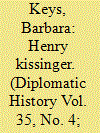

|
|
|
| 15 |
ID:
103532


|
|
|
|
|
| Publication |
2011.
|
| Summary/Abstract |
The article develops the insights of historical institutionalism and cognate work within International Relations to examine the development of security institutions within states, dealing specifically with the development of the National Security Council (NSC) in the United States. The case focuses on the creation and reproduction of the NSC as a means to fostering civil-military coordination within the US state. The article argues that exogenous shocks are crucial in providing the necessary freedom to change existing institutions, which are then set on new contingent paths. Substantively, it is argued that World War II and the experiences derived from it provided a critical juncture for the creation of new security institutions such as the NSC, and once created the NSC was characterized by forms of path dependence that have reproduced the institution over time. The article demonstrates how historical institutionalism can clarify causal mechanisms that better explain the origins and durability of internationally oriented security institutions within states.
|
|
|
|
|
|
|
|
|
|
|
|
|
|
|
|
| 16 |
ID:
108269


|
|
|
|
|
| Publication |
2011.
|
| Summary/Abstract |
Angola's oil-fuelled reconstruction since the end of the civil war in 2002 is a world away from the mainstream liberal peacebuilding approach that Western donors have promoted and run since the end of cold war. The Angolan case is a pivotal example of what can be termed 'illiberal peacebuilding', a process of post-war reconstruction managed by local elites in defiance of liberal peace precepts on civil liberties, the rule of law, the expansion of economic freedoms and poverty alleviation, with a view to constructing a hegemonic order and an elite stranglehold over the political economy. Making sense of the Angolan case is a starting point for a broader comparative look at other cases of illiberal peacebuilding such as Rwanda, Lebanon and Sri Lanka.
|
|
|
|
|
|
|
|
|
|
|
|
|
|
|
|
| 17 |
ID:
177904
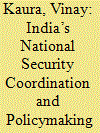

|
|
|
|
|
| Summary/Abstract |
The National Security Council (NSC) has become the most important institution on national security coordination, planning and policymaking in India, particularly since 2014. However, the government has been criticised for not institutionalising its national security architecture as many changes in the NSC system are seen as personality centric. Vinay Kaura assesses the key characteristics and functioning of the evolving NSC coupled with the role and influence of individuals and institutions. He contends that a decline in prime ministerial trust or interest, which seems unlikely until 2024, could moderate the NSC’s role in policymaking on national security.
|
|
|
|
|
|
|
|
|
|
|
|
|
|
|
|
| 18 |
ID:
055783
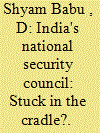

|
|
|
| 19 |
ID:
123682


|
|
|
| 20 |
ID:
126080
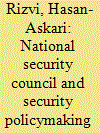

|
|
|